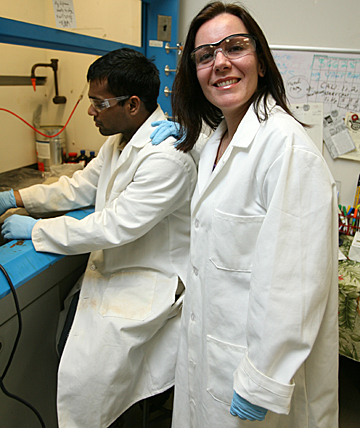Dr. Isabel Escobar has heard the stories — and has long admired Izabel Moletta, the woman she called “vovó” (“grandma”).

Dr. Isabel Escobar posed for a photo with engineering doctoral student Tilak Gullinkala, who is testing a membrane filter he developed for a project funded by the U.S. Department of Interior’s Bureau of Reclamation.
“My grandfather supported and encouraged her to pursue an education, so she would leave my aunt, who was a baby, with my grandfather, and she would take a train about an hour ride each way to go to another city so that she could get an education degree,” the UT associate professor of environmental engineering said. “And she ended up becoming the principal at the school where my grandfather was a math teacher.
“So my aunt and my mom have the same feeling toward education: You are going to school. There was never a question.”
After graduating from high school, Escobar left her home in Rio de Janeiro, Brazil, to attend the University of Central Florida in Orlando. She earned bachelor of science, master of science and doctoral degrees in environmental engineering in 1995, 1996 and 2000, respectively.
“I’ve always had a lot of support from my family to get an education and to value education. Your education is something that nobody will ever take away from you. You’ve earned it,” Escobar said. “They would always say money can come and go, a title can come and go, a position, a job, but your education comes and then you have it. My education is the most precious thing I have.”
It’s no wonder she does her part to make education more available. Escobar is involved with Gear Up and Toledo Excel, programs that help prepare middle and high school students for college, and she holds workshops for rural teachers to help put together science lessons for area migrant youth taking summer classes.
“I would love to live in a world where everyone has the choice and the ability to obtain a higher education,” she said.
Escobar also serves as the faculty adviser for the UT student chapter of the Society of Women Engineers and is the coordinator of the Catharine S. Eberly Center for Women’s Women in STEMM Excelling (WISE) mentor program that pairs incoming undergraduate female students pursuing science, technology, engineering, math or medicine with women who have experience in those fields.
“For women and minorities, it goes back to trying to be a mentor so they know they’re not the first person going through what they’re going through. You only learn this by forming a community,” she explained. “Just knowing there’s someone similar to you that’s gone through the same problem — it doesn’t make the problem go away, but it helps you breathe through it.”
And Escobar knows what it’s like to work in a male-dominated field.
“There are less than 20 percent women in engineering. Now some engineering majors have more than others,” she said. “For instance, here at UT, the incoming bioengineering class is 50 percent women. Chemical engineering, the environmental side, they all tend to have a higher percentage of women and that’s because quite often women can see how they can help a community, they feel they can help people in these fields.”
As a researcher, Escobar focuses on improving membrane filtration of water to make it drinkable. She has received more than $1 million in awards for her work.
For her outreach efforts and work in the classroom and in the lab, Escobar received the 2009 YWCA Milestone Award in education last week.
“It was very moving to me,” Escobar said of the honor. “Just knowing someone was noticing what I was doing and what I’m doing is big enough to make an impact; it still touches me so much.”